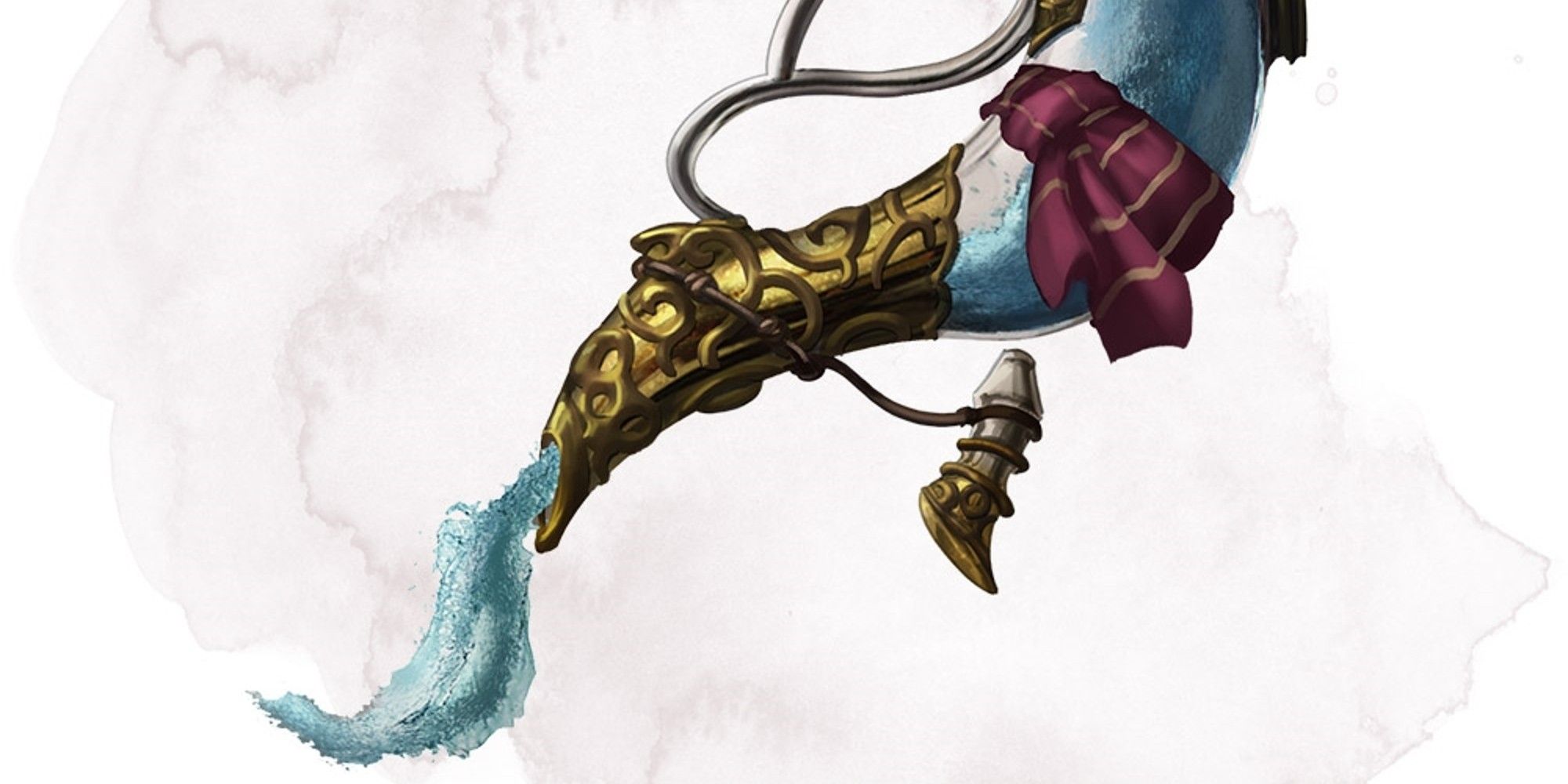Summary
- Access to magic items and superior spells in high-level games can remove tedious elements of low-level gameplay.
- Items like the Bag of Holding and Broom of Flying eliminate encumbrance and climbing and jumping rules, enhancing gameplay.
- Feats like Alert, Crossbow Expert, and Gunner can bypass or mitigate certain rules, improving combat dynamics in
D&D
.
The heroic fantasy adventures of Dungeons & Dragons rely on many rules and subsystems, but the game is also full of magical items, spells, and class features that let players ignore some of those rules entirely. Some rules that are a major concern in low-level games are easily trivialized at higher levels, effectively removing them from play. Ranged attacks normally have a Disadvantage if the attacker is engaged in melee, but the Crossbow Expert feat removes this penalty entirely. In the same way, this combat rule has an exception: magic can remove worries about encumbrance, tracking rations, and much more.
Every group is different, but the fact that so many players are eager to circumvent some of the rules that make travel and survival arduous suggests most DMs would be better off simply starting high-level Dungeons & Dragons games. This allows access to magic items, as outlined in the Dungeon Master’s Guide rules for starting higher-level campaigns and superior spells. Low-level games often get bogged down with simple geographic obstacles, mundane traveling struggles, or the minutiae of transporting treasure out of a dungeon. These may lend the game a gritty vibe, but it will quickly become repetitive.
Some DMs, especially those who cling to an “old school” mentality, may think that a game involving survival challenges, like scaling a cliff or foraging for food in a hostile environment, has appeal. Tracking encumbrance and dealing with an inability to carry treasure along with needed equipment may also feel like an iconic part of the game, but these are simple logistics puzzles and add little to the heroic fantasy adventure vibe of modern DnD. More adroit DMs will want to provide access to the spells and items that eliminate DnD’s tedious elements as soon as possible in their campaigns.
New Dungeons & Dragons Game Chose The Wrong Official Setting
Several Dungeons & Dragons based games are in development. One combines survival, action RPG, and life sim gameplay, but it chose the wrong setting.
6 Bag Of Holding
Eliminates The Encumbrance System From Dungeons & Dragons
Encumbrance is easily one of the definitive traits of low-level
DnD
games that most players find banal and uninteresting.
Encumbrance is easily one of the definitive traits of low-level DnD games that most players find banal and uninteresting. Inventory management is not exciting, nor does it contribute to the Dungeon Master’s efforts at storytelling and world-building. Once the party has access to the Bag of Holding, an Uncommon tier magic item, they can largely ignore carrying capacity save for extreme circumstances. Every party member should acquire their own Bag of Holding as soon as possible, and experienced DMs should begin making these low-rarity items available early in the game. A Bag of Holding has a few downsides.
The item does not require attunement and can contain up to 500 pounds of gear in a 64 cubic-foot extradimensional storage space. There are still some limitations, as a Bag of Holding cannot contain additional extradimensional containers, and it cannot safely smuggle living creatures that breathe. A Bag of Holding still eliminates most common encumbrance concerns, allowing the party to focus on more interesting things. For very low-level games or those where the Dungeon Master withholds access to magic items, playing an Artificer can provide Bag of Holding access at level 2 through the class’ Infusion system.
5 Broom Of Flying
Makes Climbing And Jumping Rarely Matter In Campaigns
There are several game-changing low level DnD items, and the Broom of Flying is among the very best. Dealing with verticality is a common challenge for starting characters, and many classes provide default starting equipment that includes a Climber’s Kit. The rules for climbing and jumping often come up in low level adventures, both in circumventing obstacles, and for melee characters to reach flying or elevated enemies. The Broom of Flying is another Uncommon magic item that does not require attunement, like the Bag of Holding, and it essentially removes the rules for climbing and jumping from a DnD campaign.
If the broom’s total weight carried is under 200 pounds it has a fly speed of 50 feet, which is far speedier than most characters can otherwise move, making it ideal even for battles at ground level. The jumping rules are unintuitive to new players, and climbing in battle is usually inefficient enough that ranged characters will resolve the combat before the melee characters can complete their ascent. Players are rarely sad to see environmental challenges like scaling a wall disappear from the game, especially those whose characters lack a high Strength score or training in the Athletics skill.

Everything We Learned At The D&D 50th Anniversary Event
A D&D showcase of 50th Anniversary plans offered a look into what fans can expect from the tabletop roleplaying game in 2024 and beyond.
4 Decanter Of Endless Water And Goodberry
The Rules For Avoiding Exhaustion With Food And Water Add Uninspired Low-Level Tedium
Dungeons & Dragons can be run as a wilderness survival game, as the upcoming survival and life sim DnD video game will aim to prove. Like encumbrance, survival challenges are emblematic of low-level play, and players are often eager to move past hunting for game and seeking potable water. The 5e rules for Exhaustion are relatively brutal in the otherwise forgiving game system. Going without food for several days can accrue Exhaustion levels, but going even a day without water raises Exhaustion faster. Starting characters must determine how much water and rations to carry before setting out on an adventure.
Another way to eliminate these
DnD
survival elements from play without the need for any magic items or spells is to play a Warforged character, as these living constructs do not need to eat or drink.
These low-level problems essentially weigh a party’s budget of gold along with their carrying capacity in deciding how many Rations and how much water to bring on a journey. Yet another Uncommon, attunement-free item, the Decanter of Endless Water, removes any concerns for water, and the level 1 spell Goodberry addresses food. The decanter produces endless drinkable water, and Goodberry creates 8 berries that each restore 1 HP and count as a full day’s nourishment. With this easy to access magic item and readily available spell, all rules related to food and water rules never need to see use again.
3 Goggles Of Night
Characters Mitigate The Rules For Vision And Perception
Some Dungeon Masters think Darkvision makes DnD campaigns too easy, as these storytellers may rely too much on dim and dark places to create a mood and challenge. The DnD rules on vision and perception are somewhat complex, as even characters with Darkvision or Low Light Vision still suffer Disadvantage on their Perception checks within total darkness since Darkvision only upgrades Darkness to “Dim Light.” The common Light cantrip can illuminate dark areas or a mundane torch or lantern, but Goggles of Night are still a worthwhile investment for human characters and others without natural Darkvision.
Goggles of Night, an Uncommon tier magic item that lacks an attunement requirement, provide Darkvision up to 60 feet or increases a character’s natural Darkvision by 60 feet. This does not completely remove the Vision and Light rules from play, but it does help to mitigate their influence on both travel and combat. This ensures that characters will never have Disadvantage on attack rolls for attacking in darkness, though they may suffer Disadvantage on Perception checks that go beyond the Dim Light created by the party’s light source. Removing the impact of poor lighting can only improve a DnD campaign.

D&D’s AI Talk Proves It Didn’t Learn From The OGL Debacle Last Year
Dungeons & Dragons needs a loyal community now more than ever, but recent comments about D&D and AI from the CEO of Hasbro are concerning.
2 The Alert Feat
Avoid Worrying About The Convoluted Surprise Rules With The Proper Feats
There are several DnD magic items that improve Stealth, but avoiding ambushes altogether is as simple as taking the Alert feat. The rules for surprise are poorly understood by most 5e DnD groups since there is no such thing as a “surprise round” like in prior editions, and individual characters can be surprised while other party members are not. If a character notices a single opponent, they are not surprised in round one, though an enemy they did not notice may attack them with Advantage. The Alert feat means a character can never be surprised, eliminating the cumbersome surprise rules.
Though the Alert feat prevents a character from being surprised by enemies, and their foes do not gain Advantage on attack rolls due to being unseen, it does not eliminate Disadvantage on the character’s attacks against opponents they cannot detect. A high Passive Perception and the Blind Fighting special Fighting Style introduced in Tahsa’s Cauldron of Everything can aid with detecting enemies, however.
Attempts at surprise compare a rolled Stealth check against all enemies’ Passive Perception scores. Another approach could involve simply optimizing Passive Perception, which can also allow the character to notice traps and other hazards. With a single Rogue level, 3 Bard levels, or a feat like Prodigy or Skill Master, a character can gain Expertise in Perception, doubling their proficiency bonus. Combined with the Observant feat, which raises Passive Perception by 5, a character can essentially eliminate the surprise rules as effectively as with Alert while also noticing pit traps and secret doors in the adventure.
1 Crossbow Expert And Gunner
There Are Two Feats To Fire Ranged Attacks While In Melee Range
Many editions of
DnD
impose penalties for characters firing ranged weapons or spells while directly engaged at melee range.
Many editions of DnD impose penalties for characters firing ranged weapons or spells while directly engaged at melee range, provoking one of DnD’s signature mechanics, opportunity attacks, in 3e. Third edition DnD also added accuracy penalties for firing at enemies engaged in melee. 5e’s rule still incentivizes players to switch to a melee weapon when an enemy closes or to tactically fall back to avoid firing with Disadvantage, but an easier method is to simply take a Feat. For characters built to optimize ranged damage, negating Disadvantage is well worth the investment, so they can always use their strongest attacks.
Warlocks with Agonizing Blast will want to use Eldritch Blast regularly, as will ranged characters with Feats like Sharpshooter or the Archery Fighting Style. Using an inferior melee weapon or using an Action to Disengage is not ideal for such builds. Both Crossbow Expert and Gunner negate the Disadvantage for both ranged weapons and spells fired while engaged in melee, making them useful for spellcasters as well as archers. Any Dungeons & Dragons crossbow user benefits more from Crossbow Expert, especially with Hand Crossbows, but other characters will prefer Gunner, which also adds +1 to Dexterity.

Dungeons and Dragons
- Original Release Date
- 1974-00-00
- Publisher
- TSR Inc. , Wizards of the Coast
- Designer
- E. Gary Gygax , Dave Arneson
- Player Count
- 2-7 Players
Source link

.png)


.png)
